BMW demonstrates future autonomous and connected logistics technologies
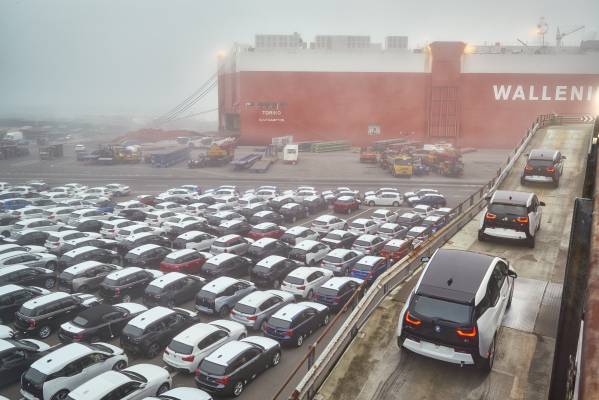
BMW has been showing off and testing its latest technologies for the future of autonomous and connected vehicles for the logistics industry, although the innovations are intended for application in its own supply chain.
The company says it will increasingly rely on innovation, digitalisation and sustainability for logistics in the future.
A fully-networked supply chain, autonomous transport robots and the use of existing vehicle information for the delivery process will make logistics even more flexible and efficient, says BMW.

Every day, a total of 30 million parts need delivering to the right place at the right time, so that around 9,000 new vehicles can be produced at the BMW Group’s 31 production locations worldwide.
Jürgen Maidl, head of logistics for the BMW production network, says: “Logistics is the heart of the BMW production system – and the use of innovative and digital technologies will become a key factor in our complex logistics processes.
“At the same time, sustainable, resource-efficient solutions are also important to us. We are already testing the technologies of the future in a whole series of pilot projects.”
From augmented reality goggles to autonomous transport systems to electric-powered trucks, the BMW Group is testing a wide variety of different technologies and innovations.
Marco Prüglmeier, project manager for innovation and industry 4.0 for BMW inbound logistics: “We have a clear vision of the future and are already exploring the technologies of tomorrow. We have identified potential for innovation in all phases of the logistics process, from inbound delivery of parts to our plants to outbound delivery of new vehicles to dealers all over the world.”
Connected supply chain: full data transparency
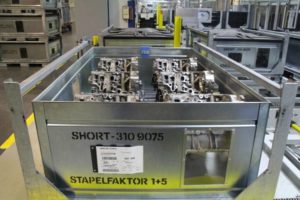
The BMW Group supply chain consists of a globally distributed supplier network, with close cooperation with various logistics service providers.
In the future, full data transparency throughout the supply chain will enable BMW to know where each item is and whether it will be delivered on time. This information allows the company to respond immediately if there is any delay.
If, for example, a truck is involved in an accident, the “connected supply chain” automatically calculates alternative courses of action and initiates corresponding measures.
At the same time, the status of process-critical parts can be monitored by sensors, using so-called “condition monitoring”.
This enables early identification of damaged parts and whether a replacement delivery is needed, thereby reducing costly extra runs and alternative processes and allowing any errors in the process to be resolved.
First fleet of autonomous transport robots in everyday operation
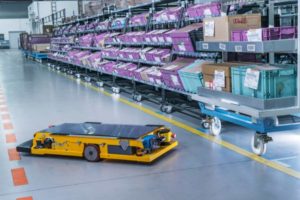
Autonomous driving also plays an increasingly important role in logistics. An initial fleet of 10 self-driving smart transport robots (STR) is transporting components through logistics at the Wackersdorf plant.
What is unique is that the self-driving transport robot does not need floor-mounted induction loops for navigation, but moves freely through the logistics hall, powered sustainably by pre-used batteries from the BMW i3 and is able to transport containers weighing up to 500 kilograms.
The STR measures the distance to wireless transmitters to calculate its exact position and route. Using sensors to identify and react to critical situations, it is able to share the route with humans and other vehicles.
After five months of prototype operation, BMW says the project will be transferred to pre-series production, where the 10 STRs will be used for the first time in everyday operations and perform transport assignments independently.
In the next phase of development, a 3D camera system will enable even more precise navigation. BMW has launched this project in conjunction with the Fraunhofer Institut IML in Dortmund.
Autonomous tugger trains in assembly
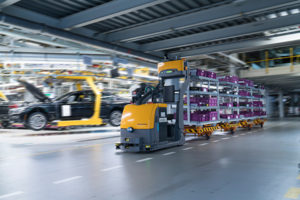
Autonomous tugger trains are being piloted in the halls of BMW plant Dingolfing. The self-navigating tugger trains are used for supplying assembly logistics – especially for longer distances between individual warehouses and assembly areas.
From a technical point of view, the independent steering and navigation of tugger trains relies on laser signals.
By evaluating their reflection, the tugger train generates a digital 2D room profile in real time, which enables it to manoeuvre through the assembly hall and logistics areas along certain routes.
Augmented reality data googles to support logistics staff
Augmented reality data goggles support logistics staff and signal to the person sorting parts where to find the right piece and where to place it.
In another scenario the usage of data goggles goes even further: The part for sorting is visually recorded by the data goggles and undergoes an optical quality check.
In parallel, the image information is compared in the background with a previously compiled database. Within a few milliseconds, the system reports back whether the component is flawless.
Using artificial intelligence, the data goggles are able to recognise different types of defects independently.
Connected distribution: greater transparency for vehicle delivery
For future deliveries from the plant to the dealer, the vehicle will become an intelligent sensor that can send or receive important information.
When the vehicle is switched off, it relays its current geolocation and status to the logistics centre via mobile connection. This information helps improve on-time delivery and reduce lead times.
In a second phase of development, the vehicle display in the interior will be used to send notifications or receipts for necessary work steps in the transport chain to dealers.
In this way, for example, route information can be displayed directly in the vehicle, making delivery more efficient overall, says BMW.
Sustainability: rail transport reduces CO2 emissions
Logistics helps the BMW Group achieve its sustainability goals, focusing on continuously expanding the percentage of CO2-efficient carriers.
One measure to reduce CO2 emissions is to increase rail transport. Today, for example, more than 60 per cent of all new vehicles leave our production plants by rail.
Rail also plays an important role in supplying plants with production material. For example, a train with vehicle parts from Regensburg and Leipzig takes the Trans-Siberian Railway all the way to northern China twice a week, transporting around 2,500 containers a year with vehicle parts to Shenyang, almost 11,000 kilometres away.
With a transit time of less than 20 days, these direct trains are more than twice as fast as the combination of sea freight and transportation through the Chinese interior, with roughly the same CO2 emissions.
Using rail, it is possible to respond at short notice to production fluctuations and follow-up orders, without requiring air transportation.
This alternative transport option has significantly reduced costs and CO2 emissions for urgent deliveries to BMW’s Chinese plants in recent years.
Electric trucks: emission-free over short distances
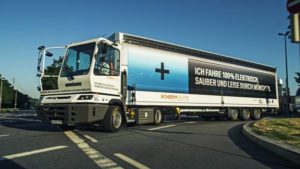
In cooperation with logistics service providers, all-electric trucks are already driving on the roads in Munich and Leipzig, making local deliveries.
The initial aim is to get to know the different drive technologies better and gain experience, says the company.
Over the long term, the BMW Group says, it is striving for “cost-efficient use of alternative drive technologies”.

